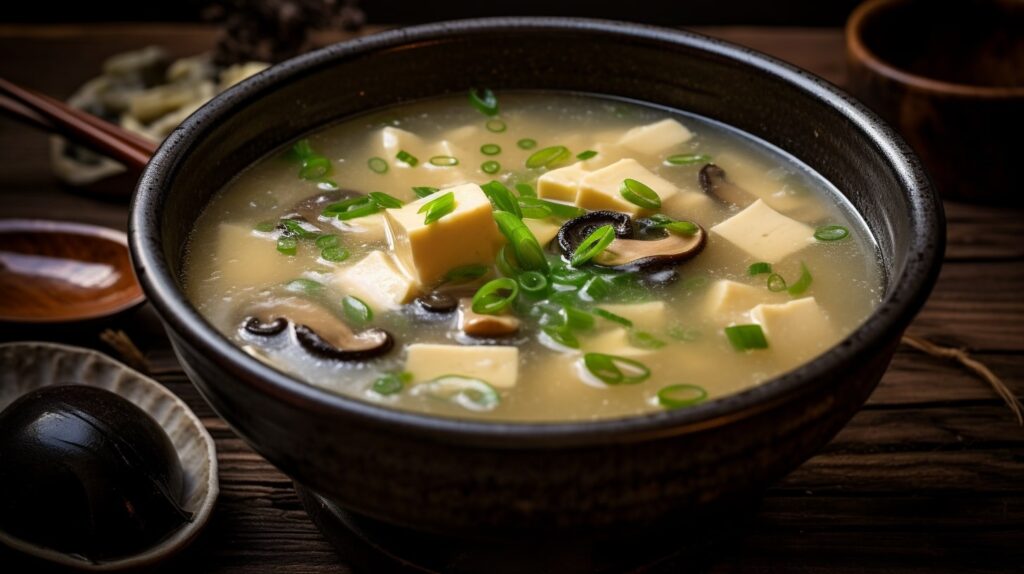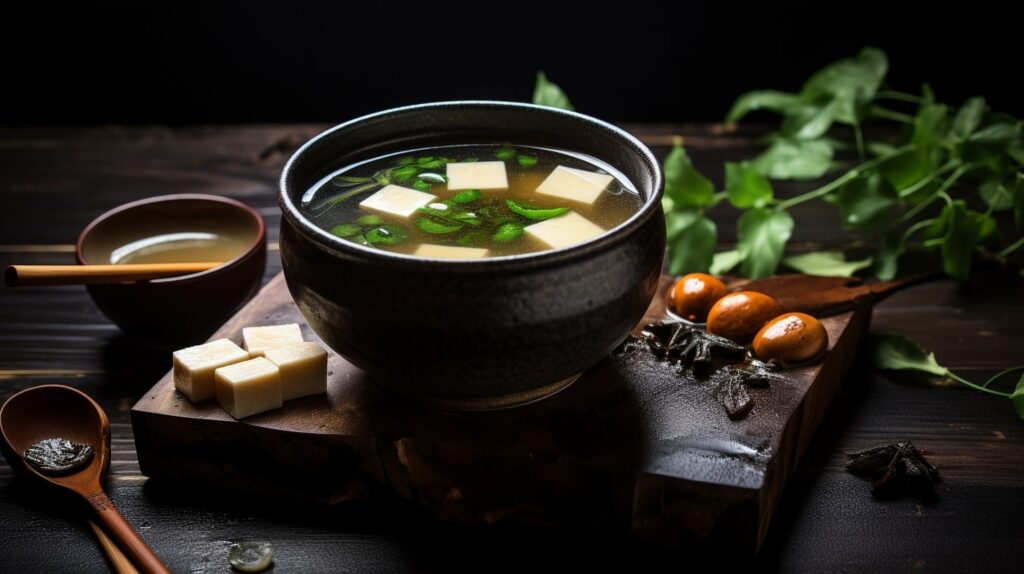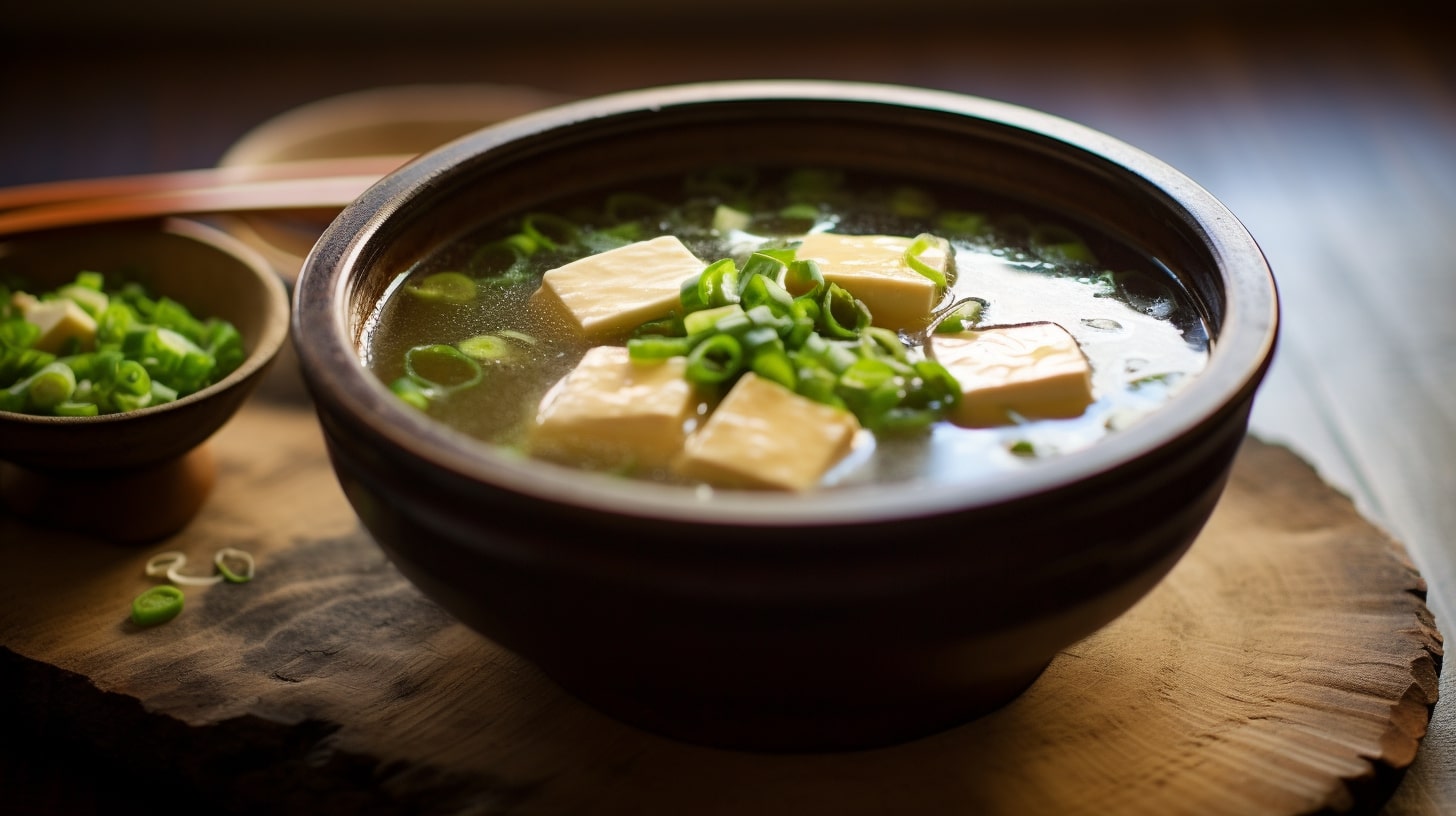Miso soup, a traditional Japanese dish, has gained popularity not only in Asia but also in the Western world. This fermented condiment, primarily known for its presence in Japanese cuisine, offers a delightful combination of flavors and a multitude of health benefits. In this article, we will explore the wonders of miso soup, its nutritional value, and the potential advantages it holds for your well-being.
What is Miso Soup?
Miso soup is a savory broth made from a thick paste called miso, which is derived from fermented soybeans. The process involves mixing soybeans with salt and a koji starter, typically containing the Aspergillus oryzae fungus. This paste can be used not only to prepare it but also to create sauces, spreads, and soup stocks, as well as to pickle vegetables and meat. The flavor profile of miso is often described as a combination of salty and umami (savory), offering a rich and satisfying taste experience.

Nutritional Value of Miso Soup
Miso soup packs a punch when it comes to nutrition. A single ounce (28 grams) of miso provides essential vitamins, minerals, and beneficial plant compounds. Here’s a breakdown of the nutritional content found in one ounce of miso:
- Calories: 56
- Carbohydrates: 7 grams
- Fat: 2 grams
- Protein: 3 grams
- Sodium: 43% of the Recommended Daily Intake (RDI)
- Manganese: 12% of the RDI
- Vitamin K: 10% of the RDI
- Copper: 6% of the RDI
- Zinc: 5% of the RDI
Additionally, it contains smaller amounts of B vitamins and other valuable nutrients that contribute to a healthy diet.

Health Benefits of Miso Soup
1. Improved Digestive Health
Miso soup’s fermentation process creates probiotics, which are known as “good bacteria.” These probiotics play a vital role in promoting a healthy digestive system. The presence of A. oryzae, a probiotic strain found in miso, has been associated with a reduced risk of inflammatory bowel disease and other digestive issues [2].
2. Strengthened Immune System
Its rich nutrient profile, including vitamins, minerals, and antioxidants, helps support a strong immune system. By incorporating miso soup into your diet, you provide your body with essential elements necessary to fight off infections and bolster overall immune function [4].
3. Reduced Risk of Chronic Diseases
Studies suggest that regular consumption of miso soup may lower the risk of certain chronic diseases. The presence of isoflavones, compounds found in soybeans, has been linked to a reduced risk of heart disease and certain types of cancer [2]. The antioxidants found in miso also contribute to combating free radicals, which can damage cells and lead to various health problems [4].
4. Support for Bone Health
It contains calcium, magnesium, and phosphorus, all of which play a crucial role in maintaining strong and healthy bones. Regular consumption of miso soup can contribute to preventing osteoporosis, a condition characterized by weakened bones and an increased risk of fractures 1. These minerals work together to support bone density and promote overall skeletal health.
5. Potential Anticancer Properties
The presence of isoflavones in miso, particularly genistein, has been associated with potential anticancer properties. Genistein is a naturally occurring compound found in soybeans and has been studied for its ability to inhibit the growth of certain cancer cells and reduce the risk of hormone-related cancers, such as breast and prostate cancer 2. While further research is needed, incorporating miso soup into your diet may have long-term benefits for cancer prevention.
6. Source of Essential Nutrients
Miso soup is a nutrient-dense food that provides a range of essential vitamins and minerals. Apart from those mentioned earlier, miso soup contains significant amounts of vitamin E, vitamin B12, vitamin B6, iron, and potassium, among others. These nutrients are vital for maintaining optimal health and supporting various bodily functions, including energy production, brain function, and cardiovascular health.

How to Enjoy Miso Soup
It is a versatile dish that can be customized according to personal preferences. Here’s a simple recipe to help you prepare a delicious bowl of miso soup:
Ingredients:
- 2 cups of water
- 2 tablespoons of miso paste (white or red)
- 1/2 cup of diced tofu
- 1/4 cup of chopped green onions
- 1 sheet of nori (seaweed), cut into small pieces (optional)
Instructions:
- In a small pot, bring the water to a gentle boil.
- Reduce the heat to low and add the diced tofu, simmering for a few minutes until the tofu is heated through.
- Take a small amount of the hot water from the pot and dissolve the miso paste in it until smooth.
- Slowly pour the miso mixture into the pot, stirring gently to combine.
- Add the chopped green onions and nori (if desired) and simmer for an additional minute.
- Remove from heat and serve hot.
You can also personalize your miso soup by adding other ingredients such as mushrooms, seaweed, vegetables, or cooked protein like shrimp or chicken. Feel free to experiment and find the combination that suits your taste buds.

In Conclusion
Miso soup is not only a flavorful and comforting dish but also a nutritious addition to your diet. With its rich flavor profile, abundance of essential nutrients, and potential health benefits, it offers a wholesome culinary experience. Whether you enjoy it as a light appetizer or a hearty meal, incorporating miso soup into your regular eating routine can contribute to your overall well-being. So, why not savor a bowl of miso soup today and indulge in its delicious and nourishing qualities?


















